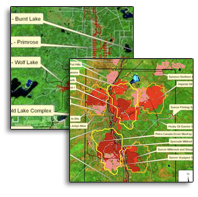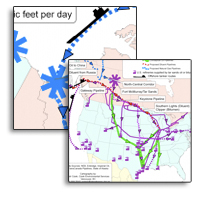Tar Sands 101
The Tar Sands "Gigaproject" is the largest industrial project in human history and likely also the most destructive. The tar sands mining procedure releases at least three times the CO2 emissions as regular oil production and is slated to become the single largest industrial contributor in North America to Climate Change.
The tar sands are already slated to be the cause of up to the second fastest rate of deforestation on the planet behind the Amazon Rainforest Basin. Currently approved projects will see 3 million barrels of tar sands mock crude produced daily by 2018; for each barrel of oil up to as high as five barrels of water are used.
Human health in many communities has seriously taken a turn for the worse with many causes alleged to be from tar sands production. Tar sands production has led to many serious social issues throughout Alberta, from housing crises to the vast expansion of temporary foreign worker programs that racialize and exploit so-called non-citizens. Infrastructure from pipelines to refineries to super tanker oil traffic on the seas crosses the continent in all directions to allthree major oceans and the Gulf of Mexico.
The mock oil produced primarily is consumed in the United States and helps to subsidize continued wars of aggression against other oil producing nations such as Iraq, Venezuela and Iran.
To understand the tar sands in more depth, continue to our Tar Sands 101 reading list
Trailbreaker Pipeline through Montréal back on?
Pipeline plan back on tap: opponents
By MICHELLE LALONDE,
The Gazette,
August 26, 2011
Enbridge seeks transit to Maine
Enbridge Pipelines Inc. is quietly trying to make an end run around a proper
assessment of its controversial Trailbreaker project to pipe tarsands oil across Canada to Montreal and then on to the United States, according to three Canadian and two U.S. environmental groups.
Enbridge Trailbreaker Project
The groups are filing a complaint with the National Energy Board on Friday
A Tar Sands Partnership Agreement in the Making?
A Tar Sands Partnership Agreement in the Making?
Macdonald Stainsby | August 1st 2011
Campaigns against tar sands production have grown rapidly over the last four years. From the relative obscurity in Alberta to an international lightning rod for people trying to address all manner of concerns from indigenous and community self-determination to peak oil and climate change – criticisms of the largest industrial project in human history have gained a major voice. The voices are certainly not homogenous, but a large contingent of these voices call for a shut down of tar sands production and a move away from fossil fuels – if not an outright move away from market-led growth of any sort. But, in the language of the environmental elite, what are the “decision makers” preparing to do with all this anti-tar sands resistance?
Into the Muskeg Swamps of Northern Alberta
Into the Muskeg Swamps of Northern Alberta
A Brief Ideological History of the Tar Sands
Earth First Journal
By Nickle
"This is not oil drilling. It's not even mining. It is
terrestrial skinning. Vast, vivid landscapes are being
gutted, left monochromatic gray." --NAOMI KLEIN
Canadian government accused of 'unprecedented' tar sands lobbying
Canadian government accused of 'unprecedented' tar sands lobbying
Friends of the Earth Europe claims ministers have attempted to undermine European fuel legislation that would affect exports
Terry Macalister
guardian.co.uk, Thursday 4 August 2011
The Canadian government has been accused of an "unprecedented" lobbying effort involving 110 meetings in less than two years in Britain and Europe in a bid to derail new fuel legislation that could hit exports from its tar sands.
CNRL resumes production, price of crude drops
Resumption at CNRL project to lower prices for oil sands crude
nathan vanderklippe
CALGARY— From Friday's Globe and Mail
Published Thursday, Aug. 04, 2011 6:26AM EDT
The price of crude is likely to decline for a number of oil sands companies as Canadian Natural Resources Ltd. (CNQ-T35.25-0.94-2.60%)brings back to life its fire-damaged Horizon project.
Athabasca eyes higher conventional budget
Following in the footsteps of Suncor, major players in tar sands production are now getting into conventional oil and gas elsewhere.
--M
Athabasca eyes higher conventional budget
By Dan Healing, Calgary Herald
August 4, 2011
CALGARY — Athabasca Oil Sands Corp. said Thursday it is considering increasing its budget to explore on its conventional Deep Basin oil and gas assets for the second time this year.
U.S. Oil Giants Poised to Gain on Keystone Pipeline
U.S. Oil Giants Poised to Gain on Keystone Pipeline
By Amy Harder
Updated: August 5, 2011
Three major American oil companies are poised to gain big if the Obama administration green-lights a controversial pipeline that would send 700,000 barrels of oil a day from the oil sands of Alberta, Canada, to refineries in Texas.
Unist’hot’en Camp II
Unist’hot’en Camp II
*
August 12 – 15, 2011 in Wet’suwet’en Territory *
[ updates will be posted here: http://unistotencamp.wordpress.com
]
Wet’suwet’en seeks to operate a second camp building further resistance
to the large influx of industrial activities in our Indigenous Lands and
Waters, often with no consent or consultation, or consultation as a
final stage of development. The major focus of this camp is largely
educational and hopefully strategic. Last year the major focus was Tar
Sands and Pipelines, and training for current and future activists to
operate as a larger body to resist Tar Sands and affiliated
infrastructure and systemic support of Tar Sands expansion.
N.W.T. pushes federal government to back Mackenzie pipeline
N.W.T. pushes federal government to back Mackenzie pipeline
By Rebecca Penty, Postmedia News July 18, 2011
CALGARY — Ottawa needs to ink a financial deal with backers of the Mackenzie Valley natural gas pipeline project by the end of the year, the Northwest Territories' Bob McLeod said following the exit of Royal Dutch Shell PLC from the partnership.
Let's expose the structure of violence that keeps the world economy running.
Let's expose the structure of violence that keeps the world economy running.
With an entire planet being slaughtered before our eyes, it's
terrifying to watch the very culture responsible for this - the culture
of industrial civilization, fueled by a finite source of fossil fuels,
primarily a dwindling supply of oil - thrust forward wantonly to fuel
its insatiable appetite for "growth."
Deluded by myths of progress and suffering from the psychosis of
technomania complicated by addiction to depleting oil reserves,



